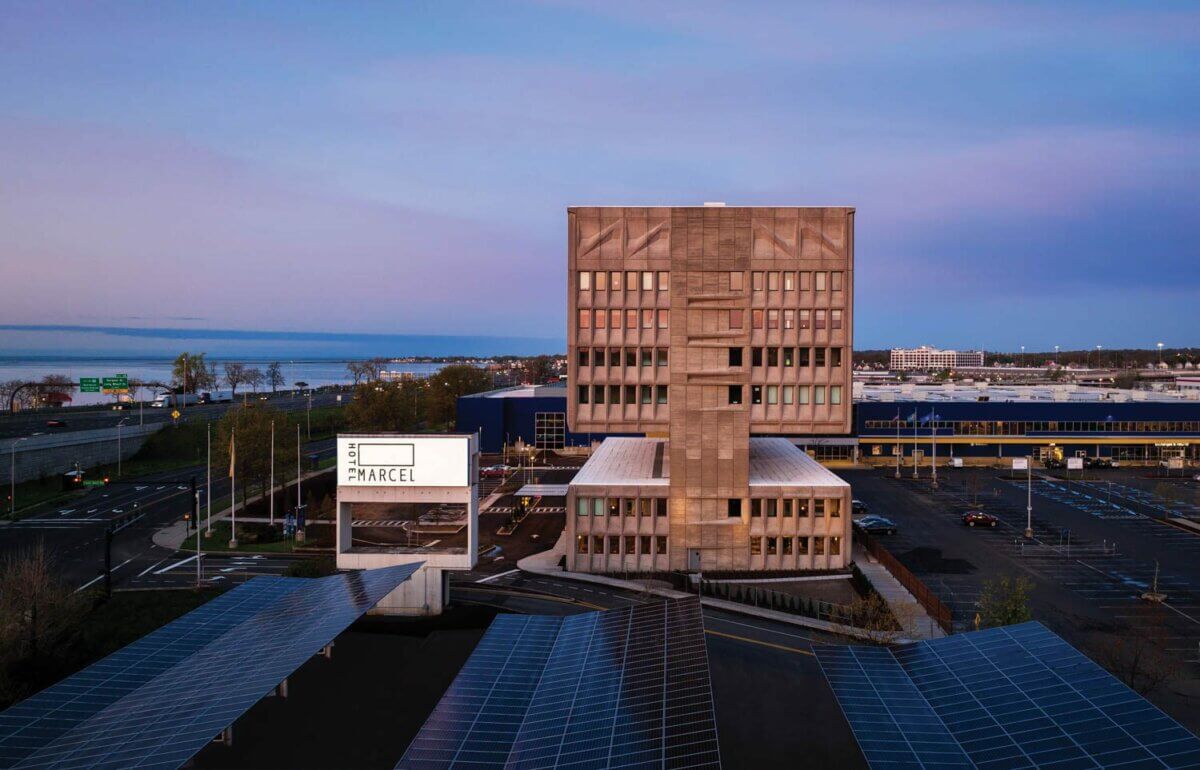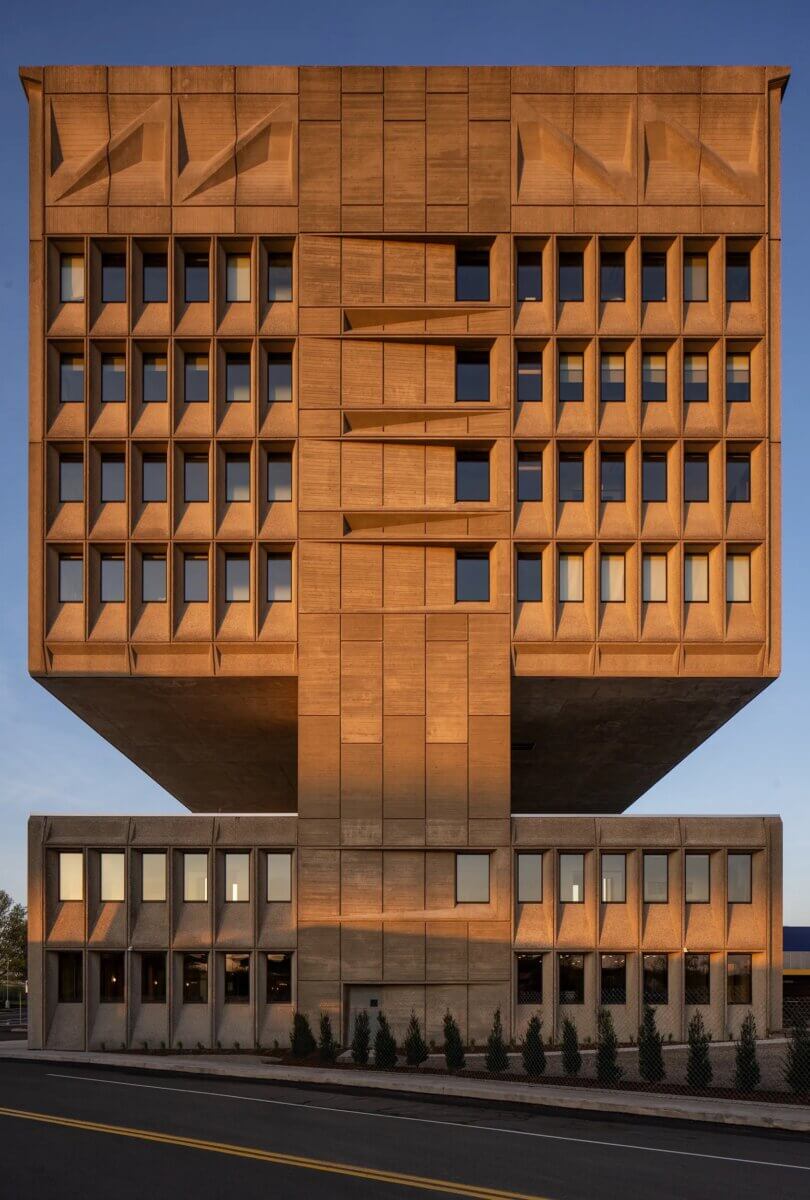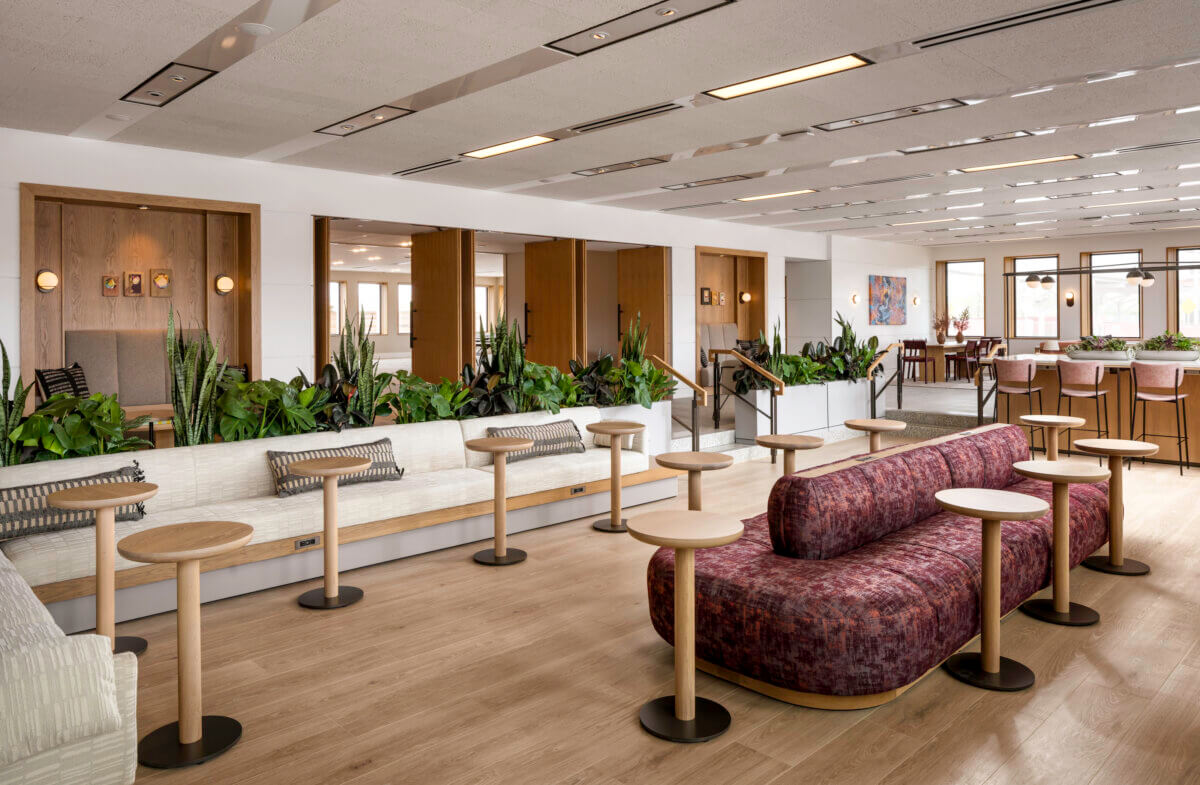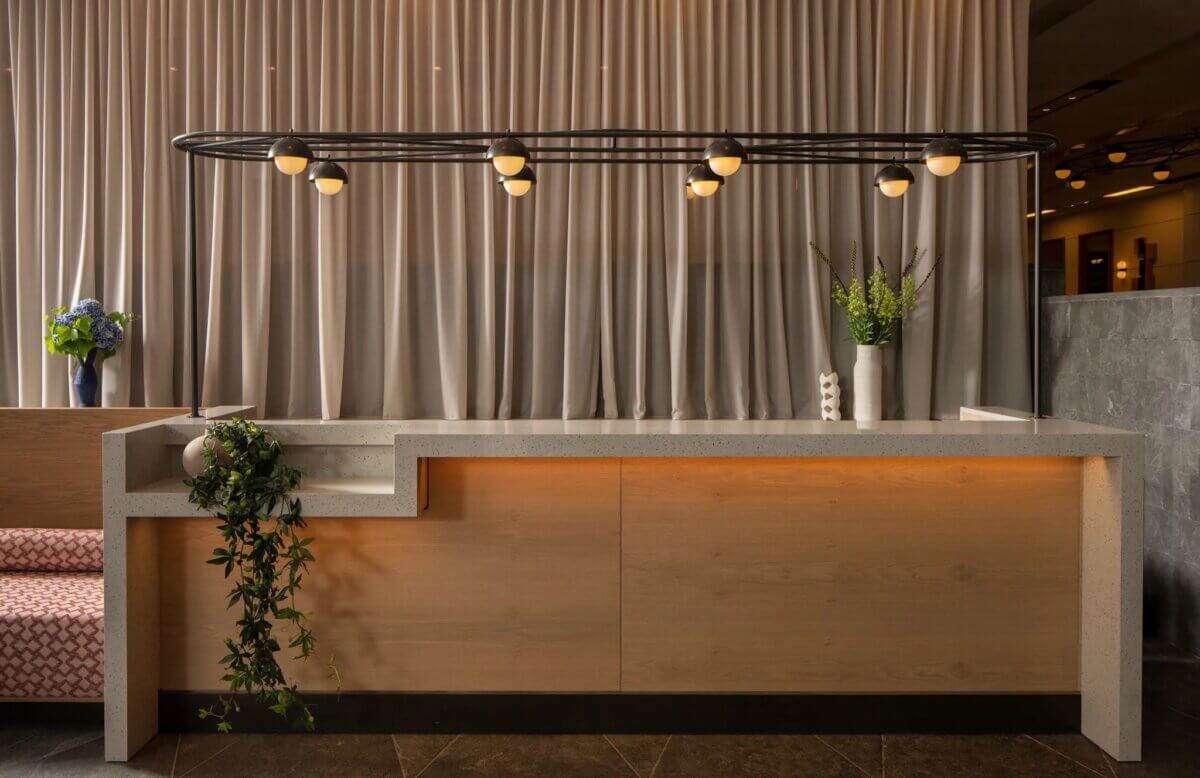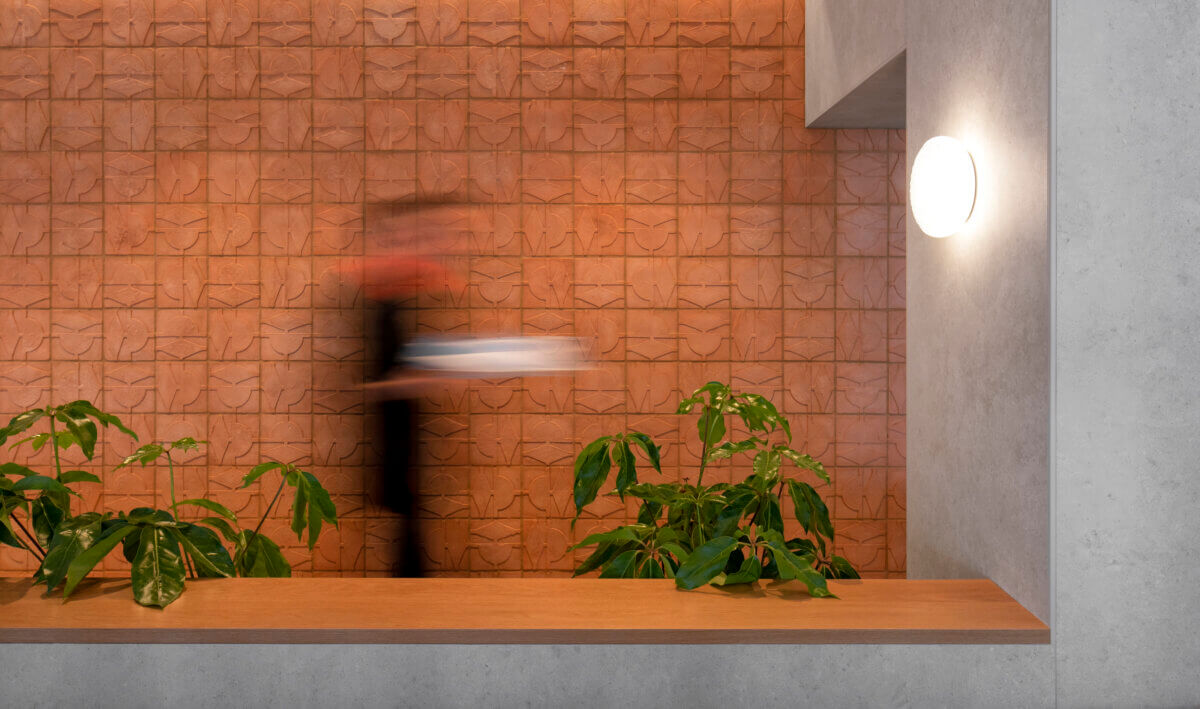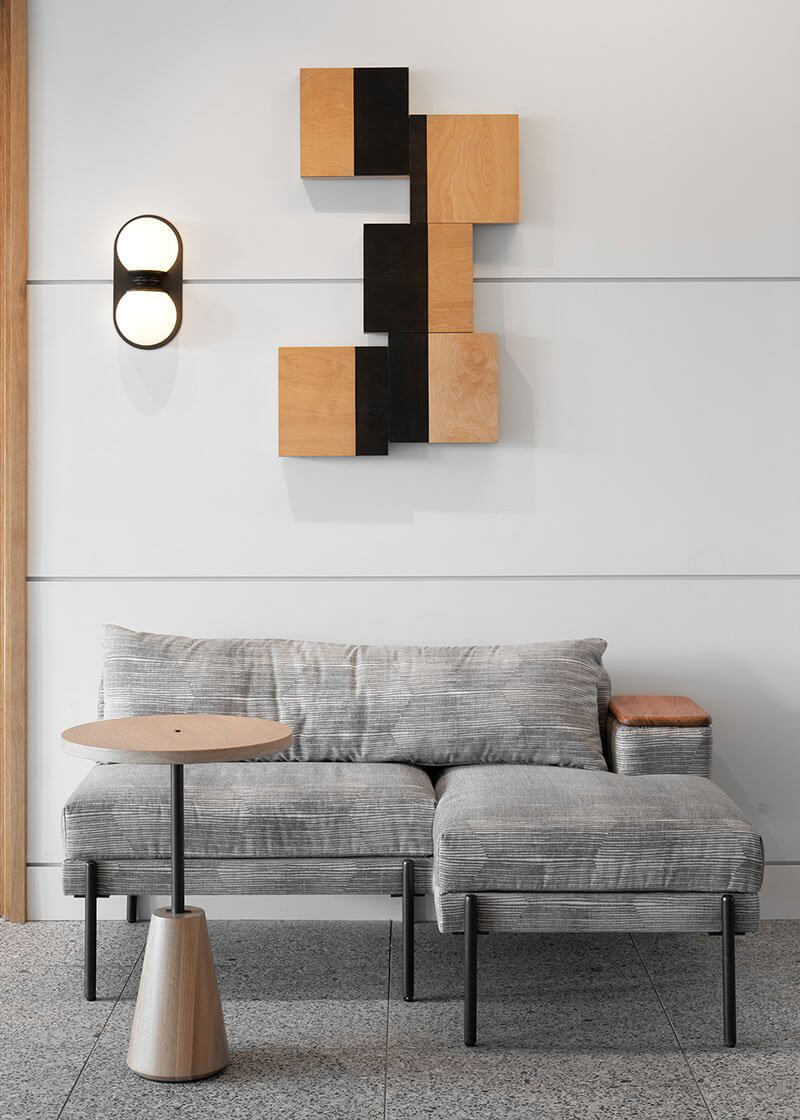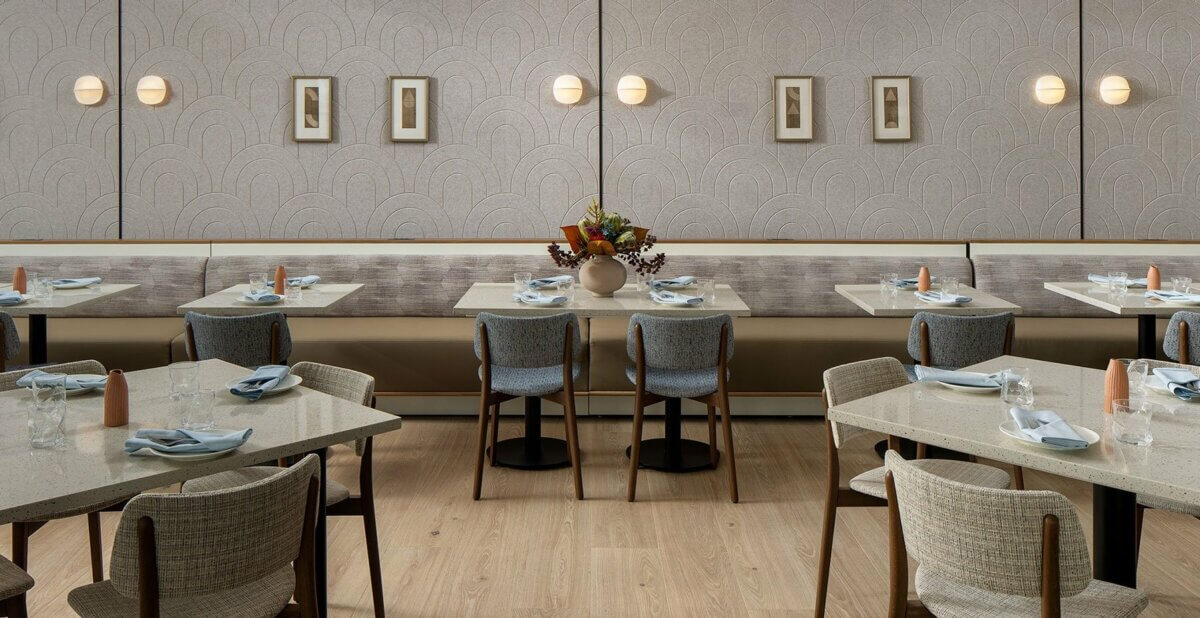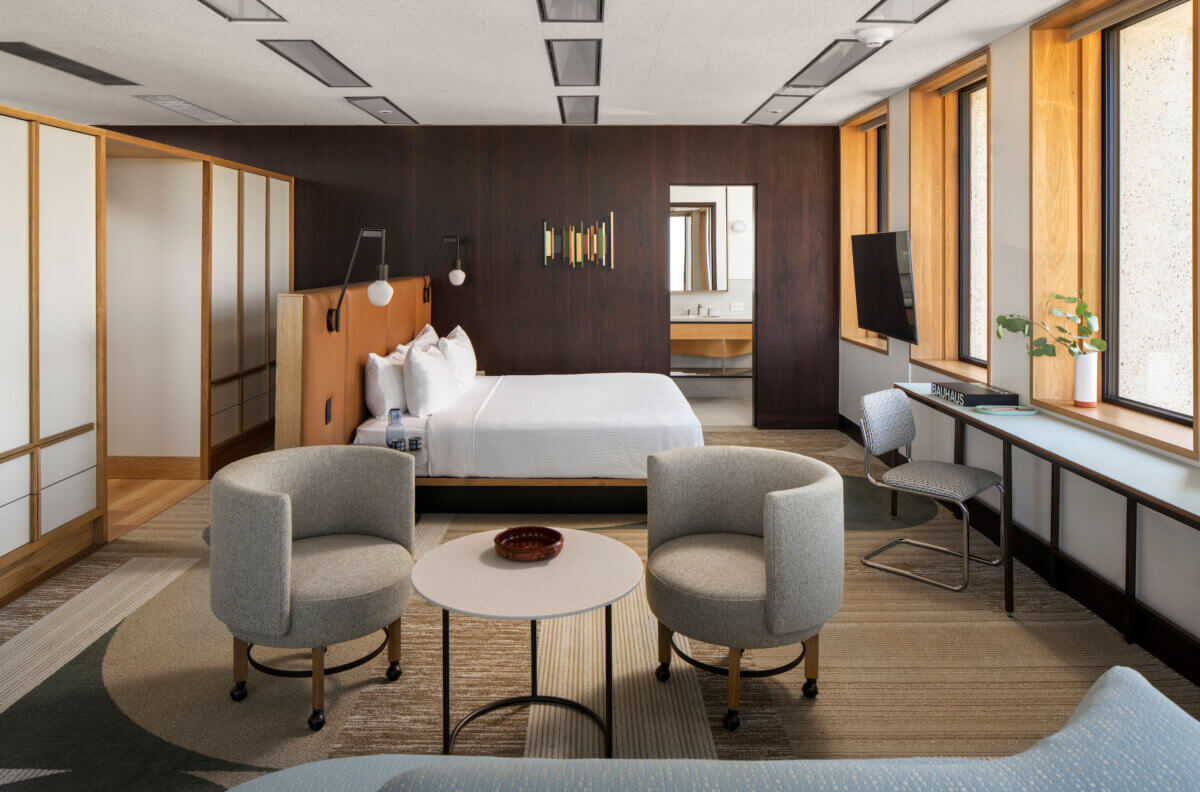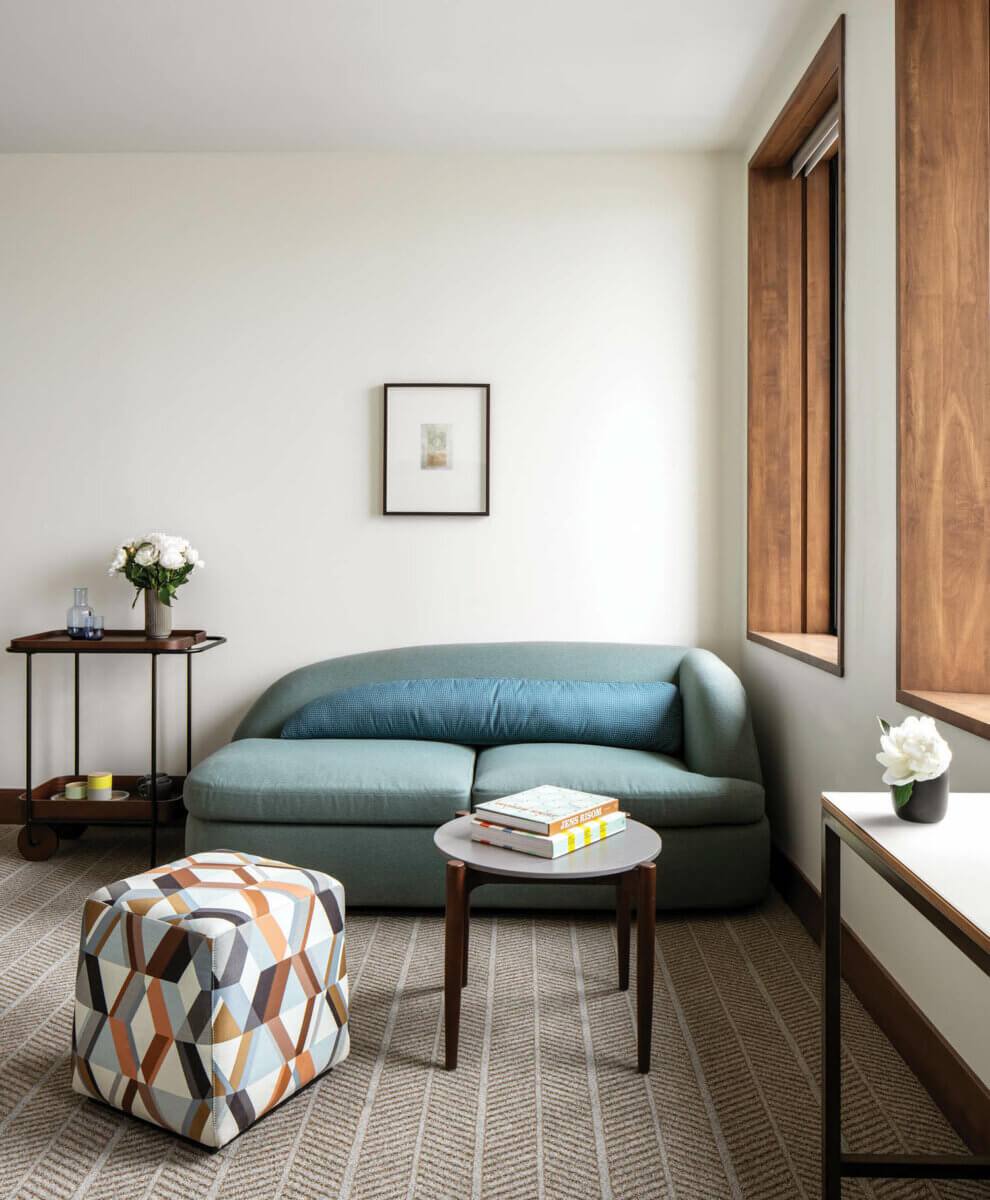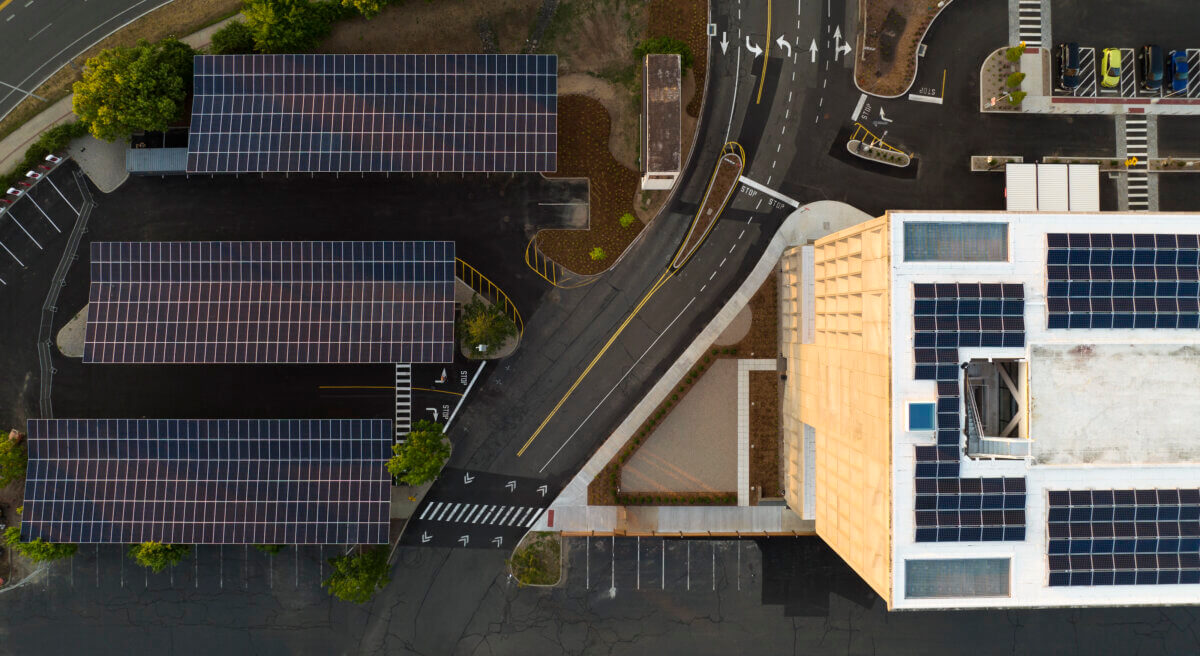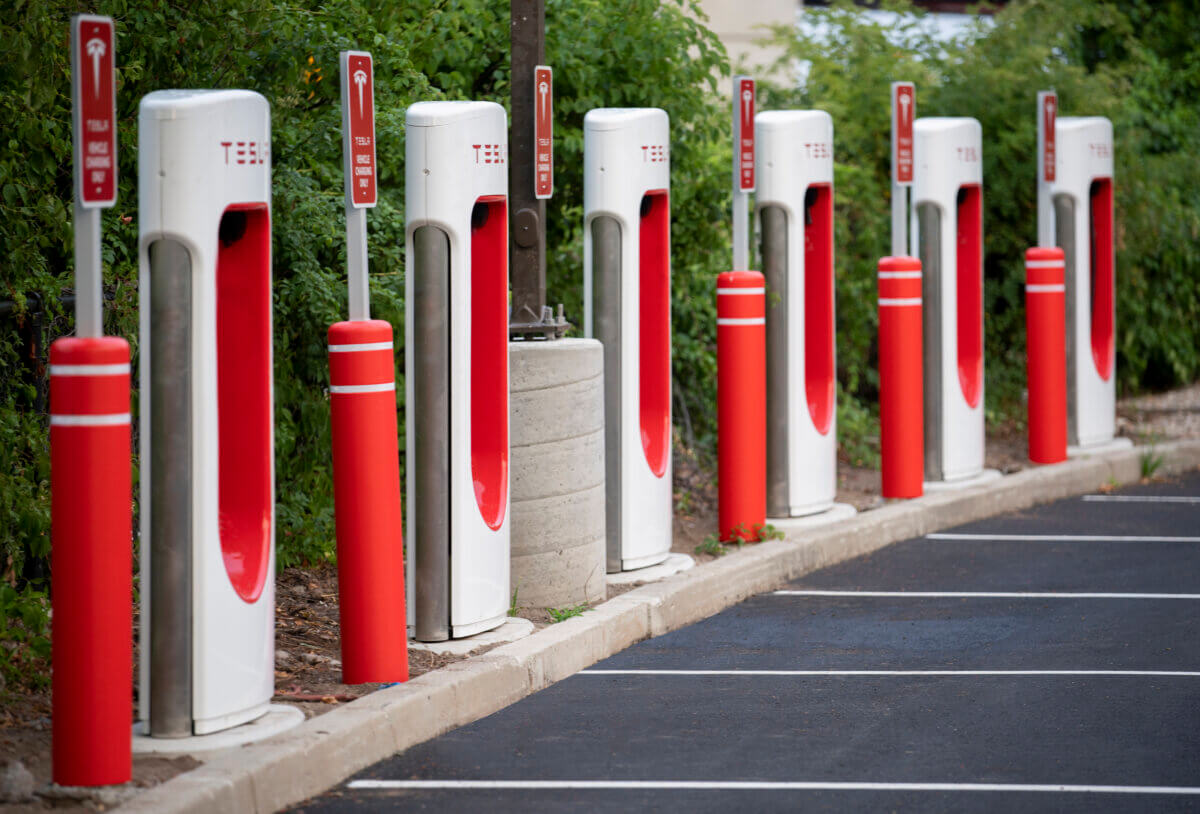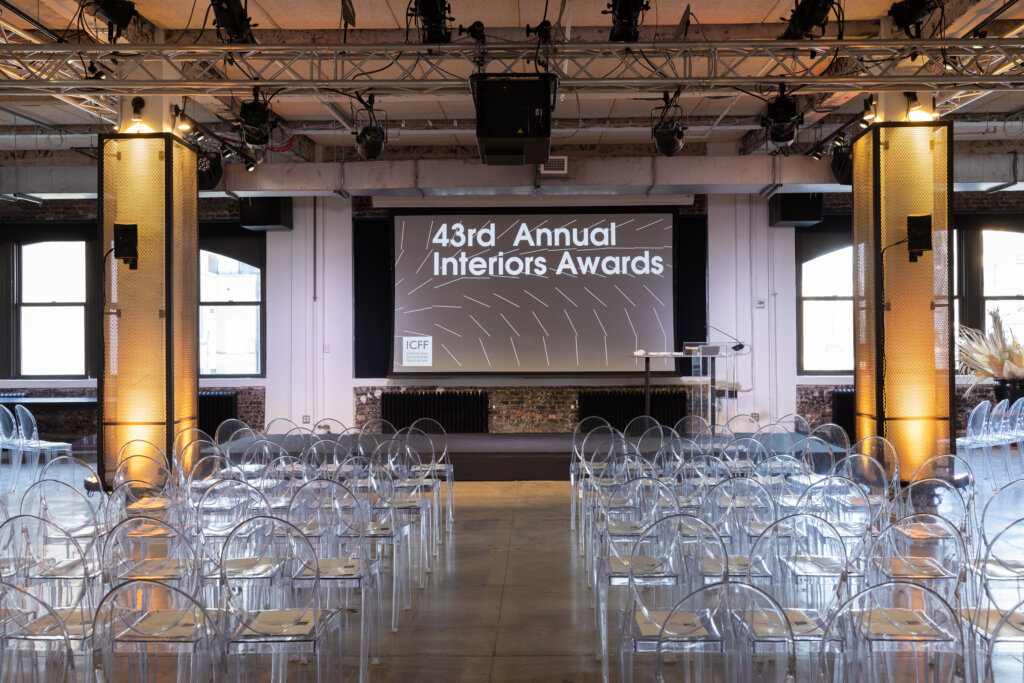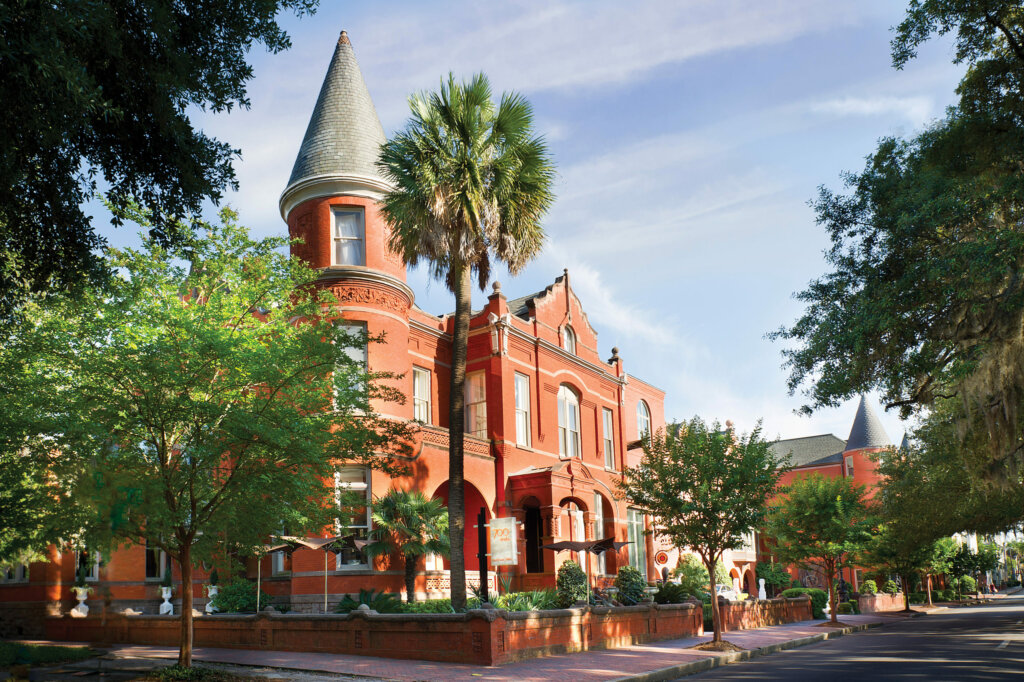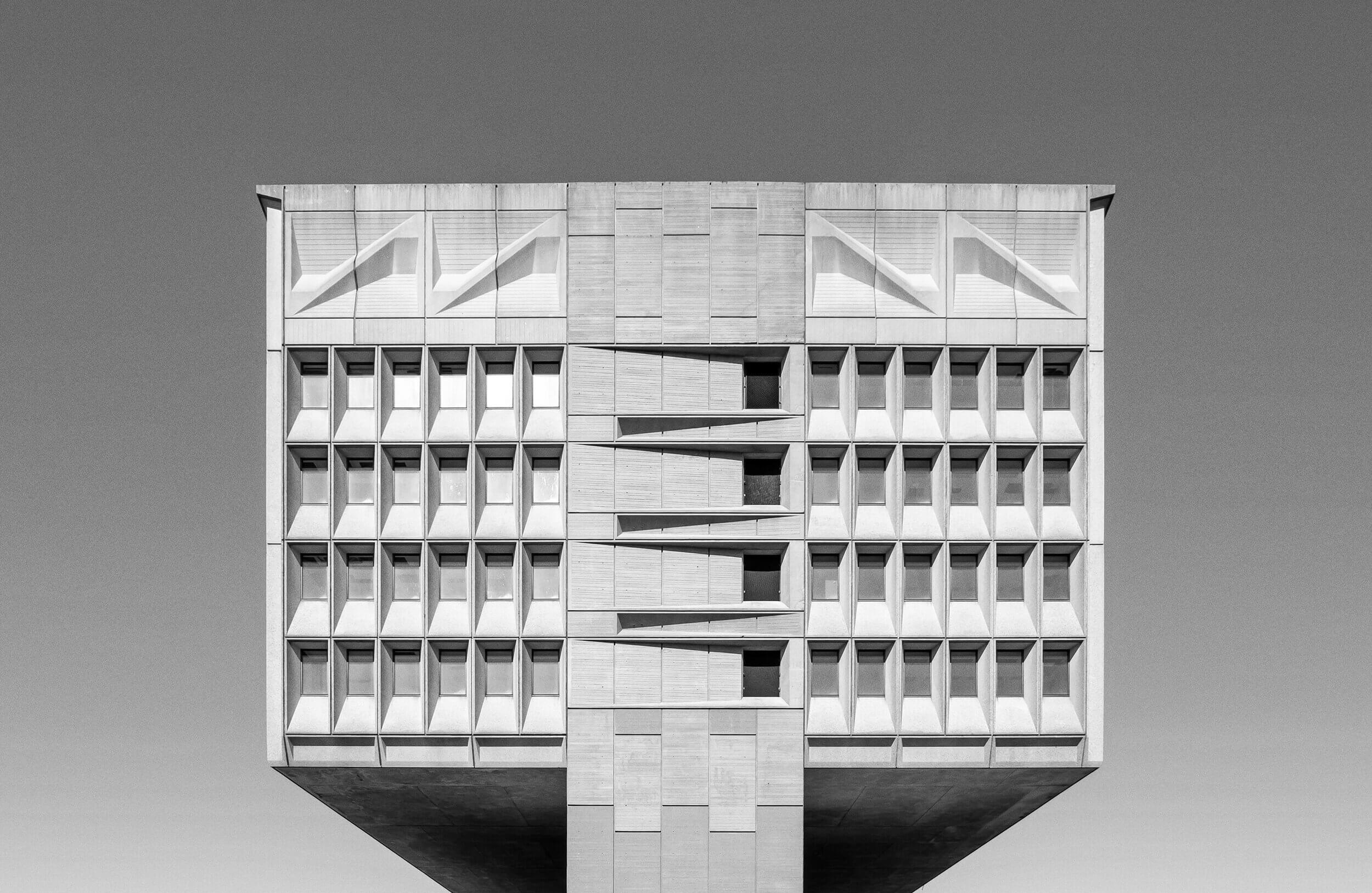
A finalist in the 2023 ICFF Interiors Awards, Becker+Becker and Dutch East Design reimagine a landmark building with Hotel Marcel, a project committed to becoming the country's first Passive House and Net Zero-certified hotel.
If we were playing two truths and a lie, the connection between a tire company, an IKEA parking lot, and famed architect Marcel Breuer might pose an obvious answer as to which is the outlier. But when is comes to the newly minted Hotel Marcel, all three stand true.
An icon of Brutalist architecture, the structure previously known as the Pirelli Building was designed in the 1960s by Bauhaus-trained architect Marcel Breuer as the headquarters for Armstrong Rubber Company, later to become the Pirelli Armstrong Tire Company. Poised above the I-95 corridor in New Haven, Connecticut, the hulking structure of pre-cast concrete tiles appears to have had its third and fourth floors scooped out, as if caught in the midst of a larger-than-life-sized game of Jenga, leaving a narrow shaft delineating the base from the upper floors. A base, incongruously, that is firmly planted in the parking lot of an IKEA.
And now, the long-vacant building has been brought back to life by local architect and developer Bruce Redman Becker of Becker + Becker with the help of Brooklyn-based Dutch East Design.
“With sustainability and historic preservation at its core, this adaptive reuse project reflects the iconic brutalist perspective of the building’s designer and hotel’s namesake,” the design team shares, “as well as serves as a model of environmental sustainability for the future of hospitality.”
Transforming the building, listed on both the state and national registers of historic places, meant taking special considerations into account in the preservation of the landmark while trying to achieve unprecedented levels of sustainability in a US-based hotel.
“The adaptive reuse itself is by far the most sustainable element of the project,” Dutch East continues, “Great attention was paid to the maintenance of elements of the historic structure.” Repurposing materials that already existed within the space was an obvious and creative start.
Following the lead of the building’s architecture, the design team set out to reflect the principals of its design in the interiors, using a similar less-is-more approach but consciously softening its hard edges to create the comfort expected of a hotel.
Upon arrival, guests are met with an interior that exhibits a softness that stands in contrast to the building’s stark facade while still honoring the minimalist narrative it started. Warm earth tones, pale woods, and rounded shapes soften stone finishes that nod to the Brutalist architecture while a feature wall clad in a terra cotta from Cle Tile is reminiscent of the original laboratory floors. The pattern on the tiles, and that of the furnishings, rugs, and lighting throughout, is Bauhaus-inspired as a nod to Breuer.
The hotel is also home to a restaurant, BLDG, that follows the same commitment to sustainability set forth in Hotel Marcel’s design. With no fossil fuels used onsite, the commercial kitchen on the premises is gas-free.
BLDG offers a menu that combines locally sourced ingredients with sustainably sourced meats paired with a beverage program that sources its collection from regional distilleries and breweries and selects sustainable, organic, and biodynamic wines.

In the event space, the designers reveal Breuer’s original architectural truss system, the imprint of which was cast as a relief into the building’s exterior.
On the guest room floors, following the original floor plans of the office allowed the team to create unique guest room shapes, sizes, and configurations for all 165 rooms. Materials such as cast concrete, caramel vinyl, and walnut were selected as nods to the era, honoring the minimalism and rawness of the Brutalist building, and are punctuated by sculptural lighting and Breuer-designed furnishings like the Cesca chair.
The eighth floor is home to the hotel’s nine historic rooms and suites, where the carefully restored and preserved wood-paneled walls of the former executive offices and boardrooms are featured. To offset the rich color of the original wood walls, a mix of light blue and warm gray textiles are used, paired with oak case goods that were fabricated 50 miles from the site using low-VOC materials and sealants. Further consideration of sustainability was paid to the windows of the rooms: motorized solar shades cover the triple-glazed windows and automatically adjust to prevent solar heat gain when the room isn’t occupied.
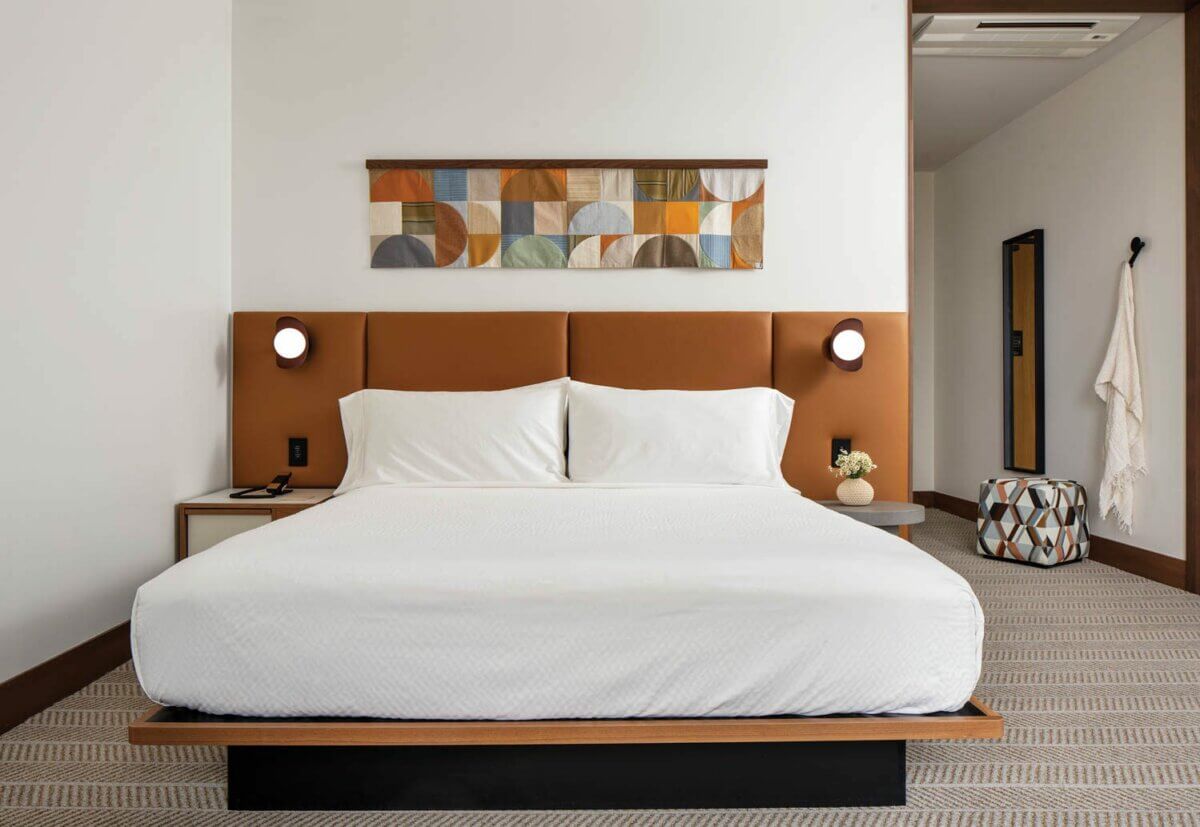
Handmade patchwork wall hangings in the King rooms feature fabrics that are archived memo samples of fabrics for the project
Hotel Marcel is set to make history as the first net-zero hotel in the United States: It is already one of a select few hotels to achieve LEED Platinum-certification and is set the be the first Passive House-certified hotel in the country.
The all-electric hotel operates independent of fossil fuels, resulting in zero carbon emissions, and produces 100% of its own electricity to power common areas, the restaurant, laundry, and all 165 guest rooms and suites. A Power-over-Ethernet lighting system and one megawatt hour of battery storage keep all operations running smoothly.
Utilizing renewable solar power sources, over 1,000 photovoltaic panels have been placed on the building’s roof and parking canopies, enabling the hotel to give back to the grid more energy than is taken.
“We are all responsible for confronting the climate crisis, and that sense of obligation factored into every decision we made in creating Hotel Marcel New Haven,” says lead architect Becker, “The opening of this revolutionary hotel, which is giving new life to a New Haven landmark, is a momentous occasion for travelers, the industry, and the planet. Guests will be ensured a terrific hotel experience and can relax knowing that both they, and the environment, are being cared for during their stay.”
